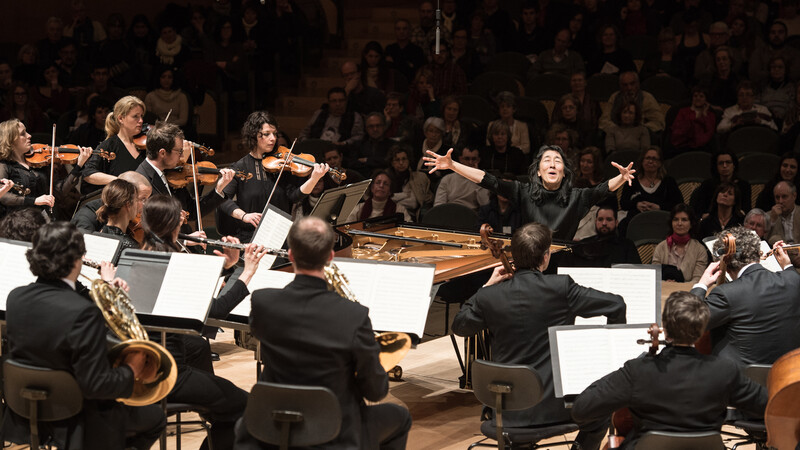 United Kingdom Mozart and Jörg Widmann: Mitsuko Uchida (piano/director) Mahler Chamber Orchestra. Royal Festival Hall, London 31.1.2020. (CSa)
United Kingdom Mozart and Jörg Widmann: Mitsuko Uchida (piano/director) Mahler Chamber Orchestra. Royal Festival Hall, London 31.1.2020. (CSa)

Mozart – Piano Concerto No.17 in G, K.453; Piano Concerto No.22 in E flat, K.482
Jörg Widmann – String Quartet No.2 (Chorale) arr. chamber orchestra
Small forces do not always fare well in large concert venues, and musical intimacy can be difficult to achieve. Yet Mitsuko Uchida, playing with and directing the 29 strong Mahler Chamber Orchestra – recently arrived after a spell at the annual Salzburg Mozartwoche – made the capacity audience in the Royal Festival Hall feel as if they were honoured guests at a drawing room recital. Sashaying onto the platform, and dressed in signature Issey Miyake black pantaloons, gold shoes and a diaphanous firefly blue top, Dame Mitsuko acknowledged the rapturous applause with a deep yogic bow, her grey flecked shoulder length hair almost touching the ground. She then took her place at the lidless piano which had been positioned to face the back of the stage, from where she played and directed.
The MCO, with whom Uchida frequently collaborates, was founded in 1997, and comprises players drawn from over 20 different countries, including Germany, Austria, France, Italy, Spain, Belgium, Sweden and Great Britain. They describe themselves as ‘a nomadic collective of passionate musicians’ who unite for specific tours across Europe and the world. How poignant, then, to have the privilege of hearing this extraordinarily talented ensemble on the very evening of the United Kingdom’s formal departure from the European Union.
The programme started and ended with two Mozart piano concertos: No. 17 in G, K.453 and No.22 in E flat, K.482. Although written merely a year apart (1784 and 1785 respectively), the moods of these two works contrast dramatically. K.453 is lighter in instrumental colour and consequently orchestrally more modest in scale. Unlike the later work, clarinets, trumpets and timpani are not employed. The strings – rich and vibrant under the firm leadership of their young and gifted guest concertmaster Alexi Kenney – embarked on the playful themes of the introductory Allegro before the first limpid notes of the piano were sounded. Uchida paced the movement perfectly, articulating each phrase with crystalline clarity and remarkable dynamic control. The first movement cadenza, written by Mozart, flowed brightly, a cascade of sparkling notes. The ensuing conversation between piano and woodwind, in particular the flute (Chiara Tonelli), was just one in a number of magical moments. The second movement Andante combined serenity and tragic intensity, sweetness and melancholy in equal measure. Those passages in which three solo woodwinds blended together in a wonderful trio were sensitively underpinned by the gentle sighs and cries of the violas. A deliciously witty Allegretto third movement banished any lingering sadness and was played by soloist and orchestra with consummate artistry.
The Concerto in E flat, K.452 was composed almost simultaneously with The Marriage of Figaro, and echoes of the opera can be heard in the concerto’s grand and confident introduction, a dramatic Allegro (cadenza) in which the piano’s rippling arpeggios meld tenderly with the stately orchestral theme. Here, Uchida struck a perfectly balanced dialogue with her players, which continued into the tragic heart of the concerto, a second movement Andante of ineffable beauty. Tonelli’s flute, entwined in a soulful duet with Fredrik Ekdahl’s bassoon, mitigated the pervasive sadness to offer moments of much needed consolation. A playful rondo at the beginning of the third movement – a skilful and uplifting collaboration between piano and orchestra – restored the concerto’s irrepressible optimism and brought the work to a triumphant conclusion.
Jörg Widmann’s String Quartet No.2, otherwise known as the Chorale Quartet arranged for chamber orchestra, was the centrepiece of the concert and a bold, imaginative choice. If the Mozart concertos at each end of the programme epitomised order, light, and enlightenment, then this work evoked a chaotic primeval sound world played out symbolically on semi-darkened stage. The orchestra’s string players, flanked from above by a bassoon on one side and a flute on the other, created a range of extraordinary sounds from their instruments – halting, fragile, grinding, explosive, occasionally piercing and sometimes barely audible. Widmann took musicians and audience alike on a challenging yet hauntingly beautiful voyage of discovery.
The final gift of the evening came in the shape of an encore – a deeply affecting performance of Schubert’s Impromptu Op.142 No.2 in A flat. Her fingers dominating the keyboard, Uchida held us in the palm of her hand.
Chris Sallon
